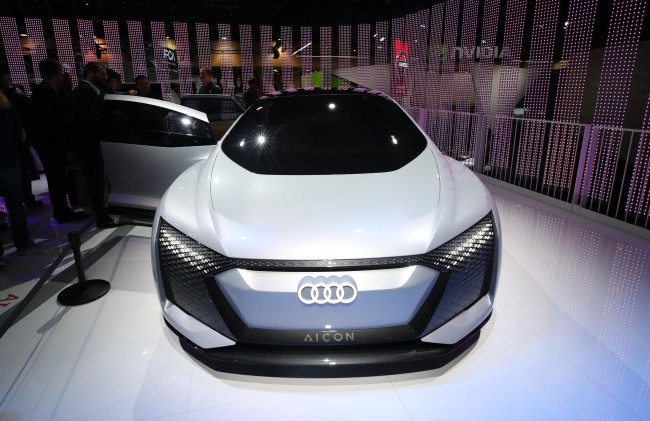Amid concerns about an anticipated slowdown in South Korea’s semiconductor exports this year, lithium-ion batteries for electric vehicles are emerging as a new pillar that will prop up the export-driven economy, said industry officials Monday.
According to forecasts by industry insiders and stock brokerages, the country’s three battery manufacturers -- LG Chem, Samsung SDI and SK Innovation -- last year won a total of around 110 trillion won ($97.6 billion) worth of orders for electric vehicle batteries from global customers.
Combined with orders on hand from the previous year, the three firms’ order backlogs are estimated to reach 175 trillion won, some industry sources say.
Such figures raise expectations that the battery industry could become the second-biggest contributor to the country’s exports, with batteries being one of the top 10 export items along with semiconductors, petrochemicals, automobiles, steel, displays and ships.
 |
Audi's EV concept car Aicon is exhibited at CES 2019 in Las Vegas in January. (Yonhap) |
Some in the industry even compare lithium-ion batteries with semiconductors, defining the battery business as “a second semiconductor business.”
Jeon Young-hyun, CEO of Samsung SDI, has long claimed in corporate messages that the growth rate of the battery industry is steeper than that of the chipmaking industry.
Industry Minister Sung Yoon-mo has also supported the industry’s rise, saying during a business event, “The lithium-ion battery market is a new business with high growth prospects that would outperform semiconductors.”
Indeed, the global battery market has been posting annual growth of 40 to 50 percent for the past few years, as players expanded investments in technology development and production facilities.
Furthermore, battery makers are now getting closer to achieving profits.

LG Chem, Korea’s No. 1 battery provider by shipments, is forecast to announce the first quarterly surplus in its EV battery business during its fourth-quarter earnings call slated for Jan. 30.
The company won 40 trillion won worth of orders last year alone, according to industry estimates. Its official order backlogs stood at 60 trillion won as of June while some forecasts show the company’s backlogs reached 80 trillion won at the end of last year.
“LG Chem’s EV battery sales are estimated to be around 3.1 trillion won in 2018, contributing to expanding the overall cell business,” said Hwang Yoo-sik, an analyst at NH Investment & Securities. “The EV battery business is forecast to grow to 5.5 trillion won in 2019 and 10 trillion won by 2020 in sales.”
Samsung SDI also attained around 40 trillion won worth of orders last year and is expected to see significant improvement in its performance last year. The firm’s annual earnings are scheduled to be announced Friday.
“It is true that the industry saw significantly increased orders last year, as global automakers announced large-scale EV projects, for example, Volkswagen,” said a Samsung SDI official.

According to a recent report by SNE Research, carmakers, including Volkswagen, Daimler, Ford, GM, Toyota and Nissan, have announced a total of $94 billion worth of investments for electrified vehicles.
“We are expecting an improved operating profit for the battery business, but mostly because of small batteries and larger ones for electricity storage systems, at least until last year. We are yet evaluating the EV battery business conservatively,” he said.
The SDI official said it is still early to expect a surplus from the electric-vehicle battery business.

SK Innovation is a relative newcomer in the electric-vehicle battery market, reportedly bagging around 30 trillion won worth of orders last year, as the company appealed to customers with aggressive investments.
Compared to 30 gigawatt-hours of order backlogs in 2016, the firm had 320 GWh of accumulated orders at the end of last year, according to the company.
By Song Su-hyun (
song@heraldcorp.com)











